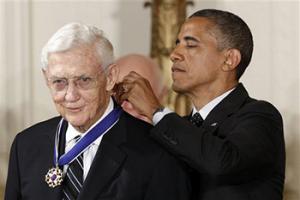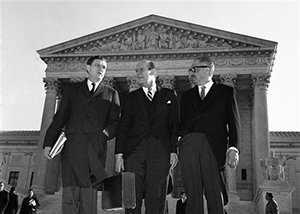
Civil Rights lawyer, John Doar, a Lincoln Republican who as a top Justice Department civil rights lawyer in the 1960s fought to protect the rights of black voters and worked against segregation in the South, died Tuesday at age 92. The cause was congestive heart failure, said his son, Burke Doar.
Doar was a Justice Department civil rights lawyer from 1960 to 1967, serving in the final months of the Eisenhower administration and then staying on during the presidencies of President John F. Kennedy and Lyndon B. Johnson. He rose to the position of assistant attorney general, or top lawyer, in charge of the department's Civil Rights Division and challenged discriminatory policies in Southern states that curtailed minority access to the voting booth and state universities.
A self-described "Lincoln Republican" who worked for the federal government at the height of the civil rights movement, he played important roles in some of the pivotal moments of that cause.
In 1962, for instance, Doar escorted James Meredith onto the campus of the University of Mississippi, even as then-Gov. Ross Barnett and angry crowds sought to keep the school segregated. He helped Meredith settle into his dormitory on a campus roiled by violent riots that left two dead.
He later was the lead prosecutor in the federal trial arising from the deaths of three civil rights workers - Andrew Goodman, James Chaney and Michael Schwerner - who were killed in 1964 while in Mississippi to help blacks register to vote. A federal jury returned guilty verdicts against some defendants, including a deputy county sheriff, but acquitted others. Those killings inspired the 1988 film "Mississippi Burning."
"This was the first time that white persons were convicted for violent crimes against blacks in Mississippi. It was a historic verdict," Doar said in a 2009 C-SPAN interview.
In a statement Tuesday, President Barack Obama called Doar "one of the bravest American lawyers of his or any era."

"Time and time again, John put his life on the line to make real our country's promise of equal rights for all," Obama said.
Later in his career, he served as special counsel to the House of Representatives as it investigated the Watergate scandal, recommending in 1974 the impeachment of President Richard Nixon. Among the lawyers on the impeachment committee staff was Hillary Rodham.
He also served as special counsel to a judicial panel that investigated U.S. District Judge Alcee L. Hastings on bribery allegations. Hasting was impeached and removed from the bench.
In awarding him the Presidential Medal of Freedom in 2012, Obama credited Doar with laying the groundwork for the Civil Rights Act of 1964 and the Voting Rights Act of 1965.
He recalled how Doar, with his hands raised, successfully pleaded with protesters outside the 1963 funeral of civil rights leader Medgar Evers to go home peacefully rather than clash with heavily-armed police officers.
"He was the face of the Justice Department in the South. He was proof that the federal government was listening," Obama said.
In the C-SPAN interview, Doar described the election of Obama as "rewarding" and marveled at the progress made toward racial equality since 1960.
"Countless black citizens in the South couldn't vote. They were second-class citizens from cradle to grave. The discrimination was terrible, brutal. And to think, you know, that's over. It's done," he said.
Follow Eric Tucker on Twitter.
Copyright 2014 The Associated Press.

Comments
A Great Man
It's so appropriate that you passed on the day when they celebrate courage and service. Humanities should be a core class in education for the generation now to learn how great this man was and learn to change our society is at present with all the chaos and situations going on. We need more people like him today. You risked your life for so many, rest in peace and thank you so much for you service!